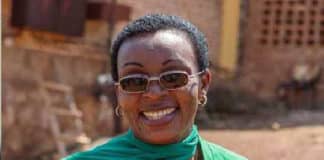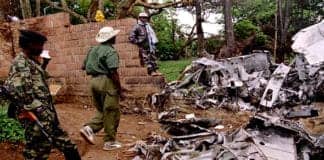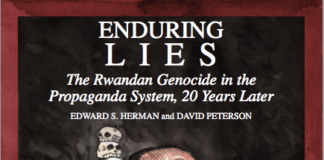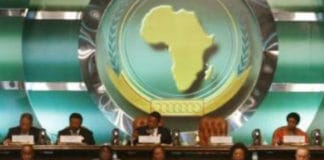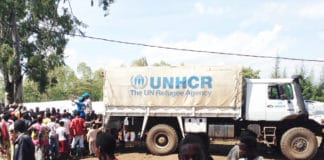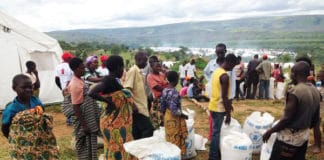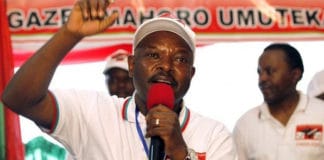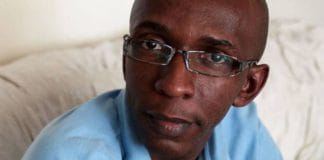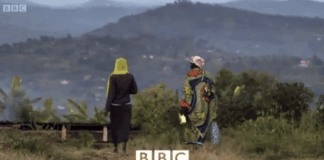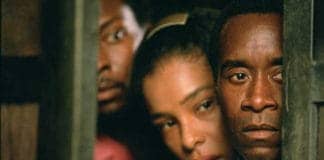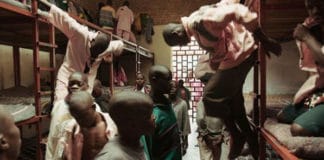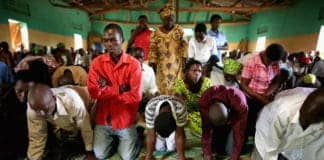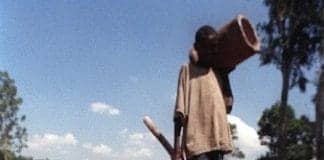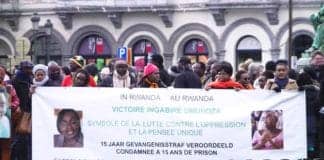Tags Tutsi
Tag: Tutsi
Victoire Ingabire walks a knife edge in Rwanda
Victoire Ingabire “is a convicted criminal who was never rehabilitated. She is not a politician, an opposition leader, but a criminal.” – New Times of Rwanda, Paul Kagame’s newspaper
The crime that turned Central Africa into a vast killing ground
April 6 was the 24th anniversary of the day that Gen. Paul Kagame shattered a ceasefire agreement and resumed the 1990-1994 war in Rwanda by assassinating Rwandan President Juvenal Habyarimana and Burundian President Cyprien Ntaryamira. His troops, acting on his orders, fired a rocket at Habyarimana’s plane when it appeared overhead in Rwanda’s capital, Kigali, returning from Dar es Salaam, Tanzania.
Rwanda, the enduring lies: a Project Censored interview with Professor Ed...
Paul Kagame, the leader of Rwanda, has killed more than five times as many people as Idi Amin. He invaded Rwanda in 1990 and carried out a war of conquest there that ended sometime in 1994. He invaded the Democratic Republic of the Congo in 1996 and went in and out of that country for years, killing what the U.N. itself admitted was probably more than 4 million people. The U.S. not only failed to stop it, we actually supported the mass killing. Paul Kagame is a double genocidist, and one could argue too that Bill Clinton was a partner in this. Bill Clinton is arguably a genocidist.
Burundi: Nkurunziza uplifts Burundi’s 93 percent rural poor
Since March, Western press and policymakers have warned of a genocide in Burundi and suggested that Burundi’s minority Tutsi population is in danger. Supporters of President Pierre Nkurunziza say that the key social divide in Burundi is not Hutu and Tutsi, but urban and rural. KPFA’s Ann Garrison spoke to William Ndizeye, a Burundian Canadian supporter of the Burundian government.
Burundi: Will the African Union force its troops on an African...
On Wednesday, Dec. 16, the African Union Peace and Security Council (AUPSC) declared its intent to send 5,000 African “peacekeeping” troops to Burundi to protect civilians, whether the Burundian government gives its consent or not. On Friday, Dec. 18, the United Nations Security Council (UNSC) took note of the African Union Peace and Security Council’s statement but did not approve the deployment against the will of the Burundian government.
Rwanda conscripts Burundian refugees into new ‘rebel force’: an interview with...
Western press and officials now warn that the Rwandan massacres of 1994 are close to a replay in Rwanda’s neighbor Burundi, which shares its Hutu-Tutsi-Twa demographic. In “Burundi’s dangerous neighbor,” a letter to the Washington Post, former U.N. official Jeff Drumtra argues that the Rwandan government’s conscription of Burundian refugees to fight in a new, so-called “rebel force” is a grave danger that the international community should recognize before it’s too late.
Burundi: Insurgents claim attack on presidential palace
In Rwanda and Burundi, the massacres of the last 20 years have followed the assassination of Hutu presidents. First, the assassination of Burundian President Melchior Ndadaye in Burundi in 1993, then the assassination of Rwandan President Juvenal Habyarimana and Burundian President Cyprien Ntaryamira in 1994. Now insurgents in Burundi claim to have fired mortar rounds on the Burundian president’s residence in Bujumbura, the country’s capital.
Rwanda: Supporters of scholar Léopold Munyakazi struggle to stop his deportation...
Supporters of suspended Goucher College French Professor Léopold Munyakazi are urgently trying to stop his deportation to Rwanda because they feel it would lead to his imprisonment, torture and/or death. The Rwandan government accused Professor Munyakazi of genocide after he made several speeches in which he said that the Rwandan massacres that took place between 1990 and 1994 were not genocide.
Rwanda and Burundi: Who’s ‘promoting instability through violence’?
As Burundian voters went to the polls on Tuesday, the U.S. State Department warned that “elections held under the current conditions in Burundi will not be credible and will further discredit the government.” It also said it planned to suspend partnerships that it hasn’t already suspended with “anyone promoting instability in Burundi through violence.” Will those “promoting instability through violence” include the renegade Burundian military officers who staged a failed coup attempt in May, then fled to Rwanda and declared war on Burundi? Will it include Rwandan military and political support for a rebel force?
UK Foreign Office calls on Rwanda to restore BBC Gahuza
The U.K. Foreign Office called on the Rwandan government to lift the ban on its BBC broadcast in Rwandans' native language. The government banned the native language broadcast after the BBC broadcast “Rwanda’s Untold Story,” a documentary which upends conventional belief about the Rwandan massacres of 1994.
Rwanda continues inquiry into BBC ‘genocide denial,’ refuses Reyntjens’ testimony
The government of Rwanda has established a Commission of Inquiry to indict the BBC for the crime of genocide denial. In its recently aired documentary, “Rwanda’s Untold Story,” the government and its supporters have accused the BBC of bias and speaking only to one side. This week, however, when Belgian scholar Filip Reyntjens offered to speak to the commission in response to those attacking him for what he told the BBC, they refused to speak with him.
Rwandans protest Dutch support for Kagame dictatorship
Rwandan Dutch citizens and political asylum seekers in the Netherlands demonstrated in The Hague, the country’s capital, on Saturday, Nov. 29. They called on the Dutch government to stop supporting the dictatorship of Paul Kagame and stop deporting Rwandans at Kagame’s request. After watching the video of the demonstration, I spoke to Jean Flammé, a Belgian attorney for a Rwandan facing extradition for supporting Victoire Ingabire.
BBC asks ‘What really happened in Rwanda?’ (with French translation)
A new BBC documentary titled “Rwanda: The Untold Story” upended the world’s basic beliefs about what really happened during the Rwandan war and genocide of the 1990s. The history that the documentary challenges is not legally enforced in the United States, as it is in Rwanda, but it is ideologically central to U.S. foreign policy. The bombing of both Libya and Syria were prefaced by U.S. officials’ urgent warnings that we must “stop the next Rwanda.”
Second genocide in Rwanda? Slow, silent, systematic?
What is happening in Rwanda? On Aug. 26, the BBC reported that Burundian officials are investigating to determine why Rwandan bodies have been found floating in Lake Rweru, on Burundi’s border with Rwanda. Both East African nations suffer from Hutu-Tutsi ethnic rivalries rooted in centuries of Hutu oppression by a feudal Tutsi aristocracy, which became a colonial elite in the 18th and 19th centuries.
Africa’s betrayal by African leaders
Africa’s elite and the elite internationally have concluded the African Development Bank’s 50th anniversary celebrations and annual meeting under the theme: “The Next 50 Years: The Africa We Want.” Over 3,500 delegates, seven African heads of state, the governor of the Central Bank of China and the U.S. deputy secretary of treasury were among the dignitaries. Beneath the confident calm, Africa is on edge, and the participants in Kigali were aware.
Rwanda: Absolute power at any price
Gen. Paul Kagame ordered the shooting down of the plane in which President Habyarimana and President Cyprien Ntaryamira of Burundi, French citizens, and all others on board were killed on April 6, 1994. This assassination triggered the genocide. Since then President Kagame has imposed a reign of terror to keep himself and the ruling party in absolute power.
Who killed the Hutu? Remembering the Rwandan Genocide
WBAI AfrobeatRadio spoke to St. John’s University Law School Professor Charles Kambanda on April 9, 2011, during the first week of Rwanda’s 17-year commemoration of the 1994 genocide. Pacifica and AfrobeatRadio producer Ann Garrison and Professor Kambanda asked us to republish the audio archive and transcript as the 20th Anniversary Commemorations of the Rwandan Genocide begin.
Rwanda’s ambassador to bring legally enforced history to Sonoma State University
Rwanda’s U.S. ambassador, Mathilde Mukantabana, is on her way to Sonoma State University to give a talk titled “Rwanda 20 Years After Genocide” this coming Tuesday, March 25, as part of the university’s Holocaust and Genocide Lecture Series. “Genocide against the Tutsi” is the legally enforced description in Rwanda, where it is a crime to say “Rwandan Genocide.”
Marching for Madame Victoire 20 years after the Rwandan Genocide
Supporters of Rwandan political prisoner Victoire Ingabire marched in Brussels, Belgium, today to denounce the Rwandan Supreme Court’s December ruling, which increased her sentence on appeal. British lawyer Iain Edwards said that he is still waiting for a translation of the ruling before saying whether or not they will appeal beyond Rwanda to a regional court or to the African Court of Human and Peoples’ Rights.
Victoire Ingabire: the woman who challenged Rwanda’s Paul Kagame
While Rwandan President Paul Kagame was in South Africa to pay his last respects to Nelson Mandela, the Rwandan Supreme Court upheld the conviction of imprisoned opposition leader Victoire Ingabire and extended her sentence from eight to 15 years. As she left the courtroom, Ingabire gave her usual thumbs up salute and urged her supporters not to be afraid, because, she said, time and history are on their side.

 Store
Store


